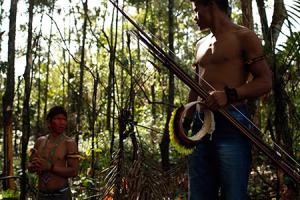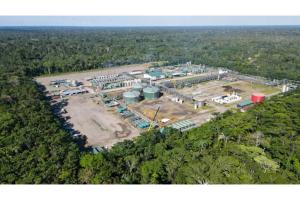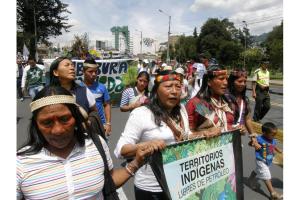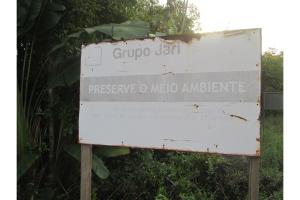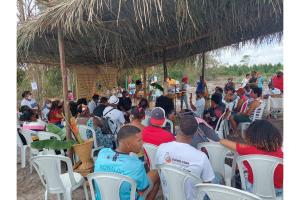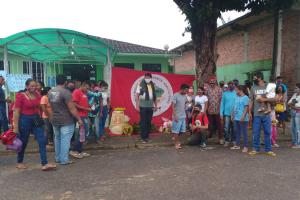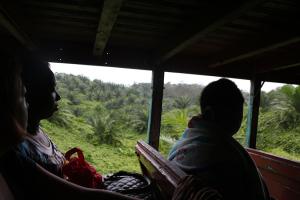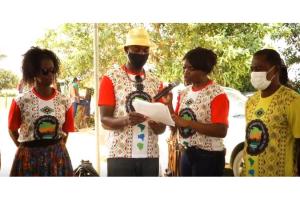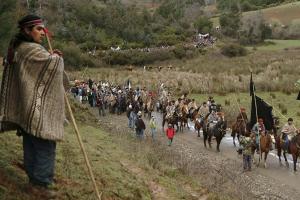Struggles for the Forests
When corporations destroy forests, or restrict or even prohibit access to forest peoples' territories, they place communities' ways of life and their very existence at risk. WRM supports forest peoples' struggles to defend their territories, and their right to decide how to live, and how to use the forests they depend on.
Bulletin articles
4 January 2022
We invite you to reflect with an activist who explores resistance processes and the challenges they face, based on her experience with struggles in Brazil. In this reflection, we also invite you to join the collective resistance from your own contexts and spaces of organization. The fight continues and the fight is one!
Bulletin articles
24 June 2025
The following excerpts are from conversations we had with people who, despite living on different continents, have made the same choice: to live without electricity. Whether they live in the Indonesian archipelago or the Brazilian Amazon, their testimonies show that electricity is not an essential resource for human life. On the contrary, for these people, it is essential to do without it.
Bulletin articles
24 June 2025
Bulletin articles
26 February 2024
The Ecuadorian people's decision to stop oil extraction in the Yasuní National Park now brings new challenges: How do you recover a territory that has been sacrificed, and bring justice to affected areas, with the solidarity of the whole country?
Bulletin articles
25 October 2023
In this editorial, at a time in which elites and oil companies continue to cling to the power and profit derived from fossil fuels, we would like to acknowledge the contribution that the Ecuadorian people have made to the world in the fight for territories free of oil exploitation.
Bulletin articles
25 October 2023
WRM’s reply to Biofílica Ambipar’s “Clarification Note” about the article "REDD and the Green Economy exacerbate oppression and deforestation in Pará, Brazil", written by WRM and published in its Bulletin of July 2023.
Bulletin articles
30 March 2023
A recent Popular Consultation in Ecuador attempted to include, among other things, ‘environmental services offsets’ as a constitutional right. The majority of voters voted against it. However, this attempt serves as a warning about the interests that wish to strengthen policies of appropriation and the commodification of nature.
Bulletin articles
12 September 2022
The quilombola communities of Sapê do Norte, Brazil, are living a violent process with the expansion of large-scale eucalyptus monoculture. After many hardships, they started a process to take back their water and land. And the struggle to take back what is theirs continues. WRM talked to two quilombola activists to reflect on this difficult but fertile process of resistance.
Bulletin articles
16 June 2022
In Brazil, oil palm plantations are expanding rapidly, mainly in the Amazonian state of Pará. BBF (Brasil BioFuels), the largest oil palm company in Brazil, stands accused of environmental crimes and violence against indigenous, quilombola and peasant communities such as Virgílio Serrão Sacramento, a community linked to the Small Farmers’ Movement (MPA).
Bulletin articles
16 June 2022
Communities resisting the impunity and impacts of oil palm growers in Ecuador: Cases from Esmeraldas
There are currently 270,000 hectares of oil palm plantations in Ecuador. The resistance processes of the communities of La Chiquita, Guadualito and Barranquilla de San Javier in the region of Esmeraldas continue to generate outrage and solidarity among other communities, and internationally.
Bulletin articles
16 June 2022
Quilombola Communities’ Resistance Against Suzano Company in the Southernmost part of Bahia, Brazil
A conversation with the president of the Volta Miúda Quilombola Association and of the Southernmost part of Bahia Quilombola Cooperative revealed how Suzano, the world’s largest paper and cellulose corporation, continues to operate with serious violations and illegalities. Communities keep fighting to reclaim their lands back.
Bulletin articles
23 March 2022
What a certain historiography terms civilizational expansion or capital’s expansion has in fact been the invasion and de-territorialization of peoples and communities using much epistemic and territorial violence. Concessions have been granted in areas that are not demographic voids, a colonial concept that ignores the fact that they have been populated for millennia.
